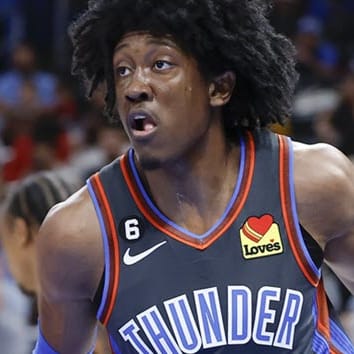This article is part of our NBA Injury Analysis series.
The Spurs forward is out indefinitely after experiencing "an occurrence of a minor heart arrhythmia." A heart arrhythmia or irregular heartbeat can occur due to a multitude of factors, some more serious than others. An arrhythmia associated with a heart attack or structural changes within the heart can be life-threatening while other less severe factors, including fatigue, stress, and a variety of metabolic issues can also cause an irregularity.
For Aldridge, this recent episode is just the latest cardiac issue he has dealt with since entering the NBA. During the final weeks of his rookie campaign in the 2006-07 season, Aldridge was diagnosed with Wolff-Parkinson-White Syndrome (WPW), a condition that affects the natural conduction system of the heart. The diagnosis and subsequent treatment resulted in Aldridge missing the final nine games of the year. Prior to the 2011-12 season the arrhythmia resurfaced during the preseason, he again underwent a procedure known as a catheter ablation and didn't miss a single regular season game due to the condition.
To better understand WPW, consider a simple circuit. A battery generates power that is utilized by a resistor, most commonly a light bulb. The steady stream of power allows the light bulb to illuminate. A heart has a comparable electrical system that controls the pace at which the heart contracts and pumps blood. Instead of a battery, a group of specialized cells generates the electrical impulses of the heart. These travel down a specific pathway and ultimately cause cardiac muscle to
The Spurs forward is out indefinitely after experiencing "an occurrence of a minor heart arrhythmia." A heart arrhythmia or irregular heartbeat can occur due to a multitude of factors, some more serious than others. An arrhythmia associated with a heart attack or structural changes within the heart can be life-threatening while other less severe factors, including fatigue, stress, and a variety of metabolic issues can also cause an irregularity.
For Aldridge, this recent episode is just the latest cardiac issue he has dealt with since entering the NBA. During the final weeks of his rookie campaign in the 2006-07 season, Aldridge was diagnosed with Wolff-Parkinson-White Syndrome (WPW), a condition that affects the natural conduction system of the heart. The diagnosis and subsequent treatment resulted in Aldridge missing the final nine games of the year. Prior to the 2011-12 season the arrhythmia resurfaced during the preseason, he again underwent a procedure known as a catheter ablation and didn't miss a single regular season game due to the condition.
To better understand WPW, consider a simple circuit. A battery generates power that is utilized by a resistor, most commonly a light bulb. The steady stream of power allows the light bulb to illuminate. A heart has a comparable electrical system that controls the pace at which the heart contracts and pumps blood. Instead of a battery, a group of specialized cells generates the electrical impulses of the heart. These travel down a specific pathway and ultimately cause cardiac muscle to contract and allow the heart to pump.
In individuals with WPW syndrome, the simple circuit of the heart is complicated by the presence of an extra electrical pathway. This extra pathway can cause the impulses of the heart to become overloaded or disordered, throwing off the heart's normal rhythm. While individuals with WPW may present symptom-free, most affected people report symptoms associated with tachycardia better known as a rapid or abnormally fast heart rate.
Medications may help treat arrhythmias associated to WPW but a procedure known as a radiofrequency catheter ablation is frequently used to directly address the root of the problem. In this treatment method, a catheter is inserted near the groin and run up into the heart. There, a low-volt, high-frequency energy form is introduced to wipe out the extra pathway. This is precisely the procedure Aldridge underwent in 2007 and 2011. The procedure has a normally high success rate, creating a unique situation for Aldridge.
The All-Star forward is expected to undergo further testing on Monday to provide a complete picture of what is going on to cause his most recent arrhythmia. The team is rightfully treating the situation with the utmost care and has ruled him out indefinitely. The results of Monday's test should help establish a treatment plan for Aldridge, but for now it appears San Antonio will be without his services for the immediate future.
Pau Gasol appears most likely to take over the starting power forward position with David Lee and Dewayne Dedmon set to garner extra minutes in the rotation.
Fast Breaks
Utah Big Men: The Jazz frontcourt could be particularly thin this week, as both Rudy Gobert and Derrick Favors are managing knee injuries. Favors' injury was diagnosed as a bone contusion on his problematic left knee. This marks the third time this season Favors has had problems with this knee, including a previous bone contusion that cost him 13 games in late November and early December. The injury will likely cost him a handful of games, making him an unreliable fantasy option moving forward. Gobert's injury is a bit more vague. The injury is being listed as leg soreness, though the root of the pain hasn't been revealed. With the postseason approaching, it appears Utah will take the conservative route with his recovery and hold him out until he's a 100 percent. He's considered questionable for Monday's matchup with the Clippers. The Jazz do have a four-game slate this week, but owners in weekly leagues are gambling on a midweek return. Tread cautiously here and make that decision as close as you can to Monday's deadline.
Malcolm Brogdon: Milwaukee's Rookie of the Year contender was unable to bolster his resume over the weekend due to lingering soreness in his back. Like with Gobert, the exact injury has yet to be revealed, though quotes by Brogdon suggest it is an acute issue and not one that has been lingering. Consider him day-to-day for now.
Goran Dragic: The Miami point guard didn't suit up Sunday due to a grossly swollen right eye. Dragic took an elbow to the face the night before that resulted in the swelling and a right orbital contusion. The eye was swollen shut on Sunday, impeding his vision, and the Heat wisely elected to hold him out. Josh Richardson got the start and finished with nine points on 2-of-7 shooting. It appears that Dragic was able to avoid the concussion protocol, meaning he will be able to return as soon as the swelling subsides.
Kawhi Leonard: Aldridge's absence was compounded by another injury to the frontcourt when Leonard suffered a concussion during a loss to the Thunder late last week. He was not available for their weekend contest against the Warriors but has progressed through various stages of the league-mandated concussion protocol. The team is optimistic he will return Monday, but head injuries can be difficult to predict and manage. Look for Leonard's availability to be a game-time decision.
Nerlens Noel: The Mavericks added Noel at the trade deadline and boosted his fantasy value in the process. Noel has seen his minutes increase by five since joining Dallas and is averaging 10.0 points, 8.5 rebounds and 1.3 blocks in his six appearances. Unfortunately, soreness in his left knee prevented him from playing in Dallas' last two games though the issue is reportedly improving. The left knee is the same knee Noel required surgery on during the preseason to remove an inflamed plica. Dallas' medical staff is highly regarded and should have Noel back on the court quickly. Keep a close eye on his availability leading into Monday's game in Toronto. Dwight Powell would continue to see extra playing time if Noel is out.










